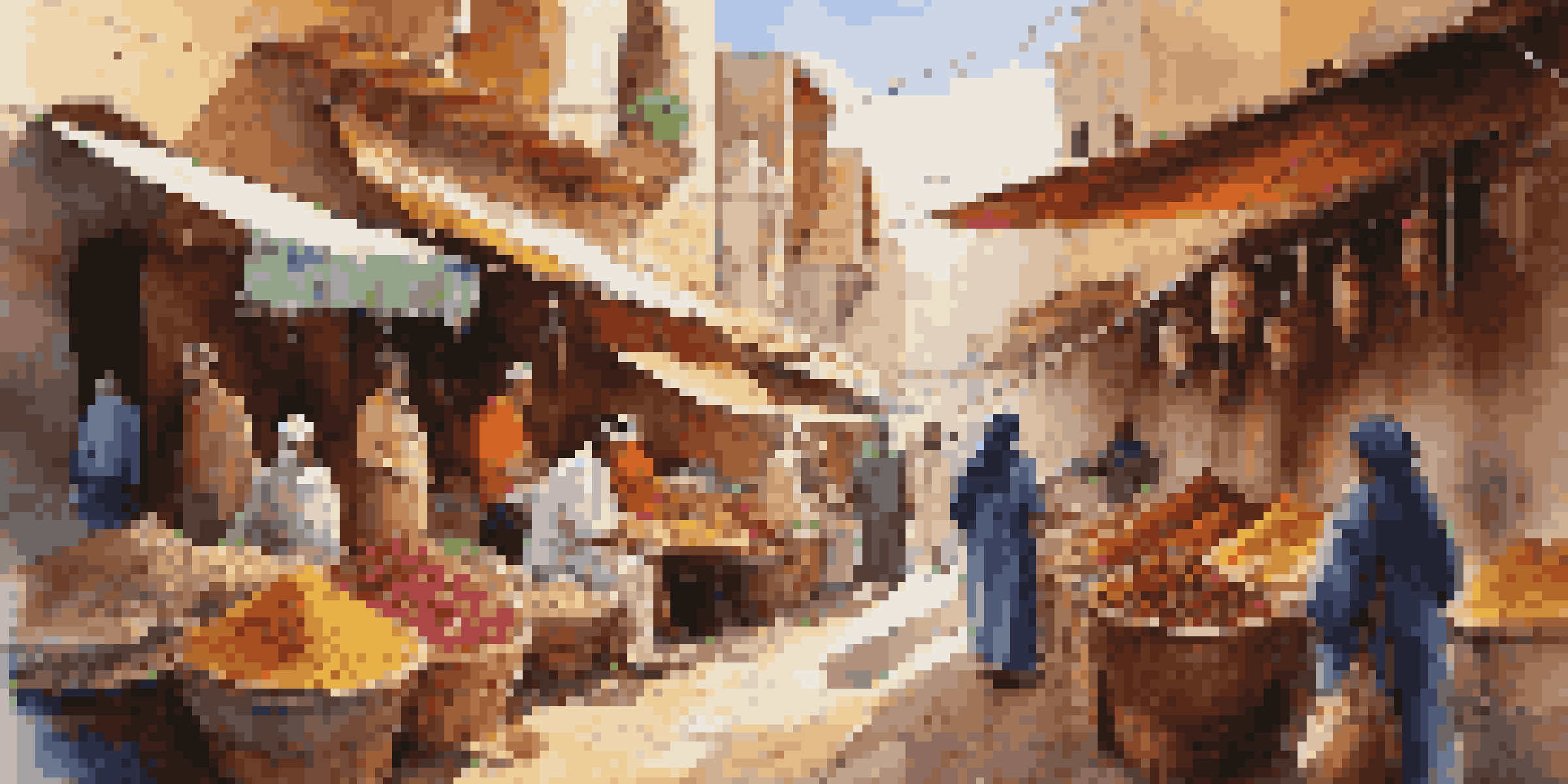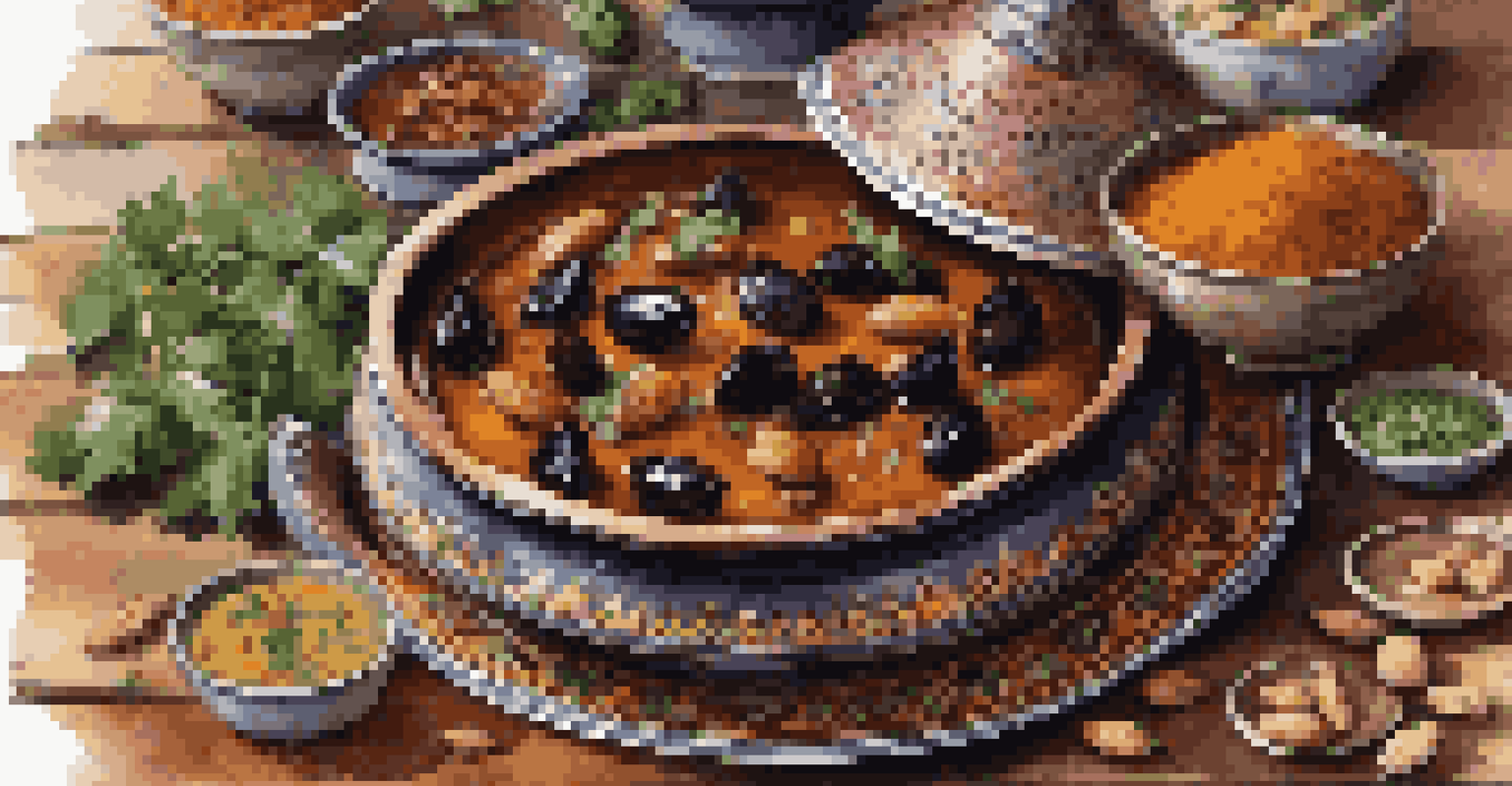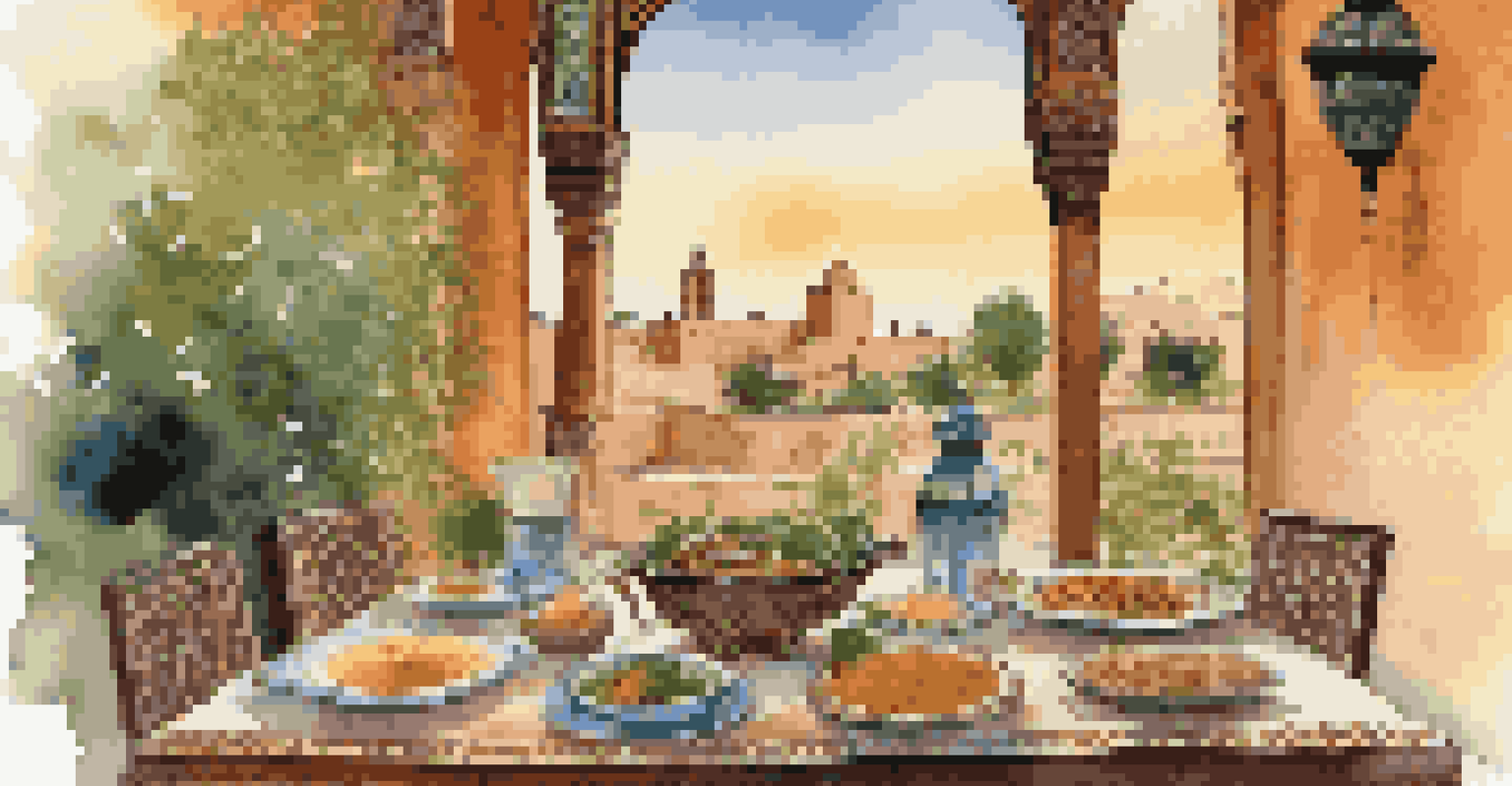Food and Culture: Culinary Tours in Morocco

The Rich Tapestry of Moroccan Cuisine and Culture
Moroccan cuisine is a vibrant blend of influences, reflecting the country's diverse history. From Berber to Arab and even Mediterranean flavors, each dish tells a story of cultural exchange. This unique culinary landscape makes Morocco a fascinating destination for food lovers and cultural enthusiasts alike.
Food is our common ground, a universal experience.
When you embark on a culinary tour in Morocco, you’re not just tasting food; you’re experiencing centuries of tradition. For instance, the iconic tagine, a slow-cooked stew named after the earthenware pot it’s cooked in, showcases regional ingredients and cooking techniques passed down through generations. Each bite offers a glimpse into the local lifestyle and values.
Moreover, food is deeply woven into the social fabric of Moroccan life. Meals are often shared among family and friends, symbolizing hospitality and community. As you explore this culinary heritage, you'll find that every dish has a purpose, whether it’s to celebrate a special occasion or simply to bring people together.
Must-Try Dishes on Your Culinary Journey
No culinary tour of Morocco is complete without indulging in some signature dishes. Start with a classic Moroccan tagine, which can come in various forms, from lamb with prunes to chicken with preserved lemons. Each variation showcases local spices and fresh ingredients, making every experience unique.

Another dish that should be on your radar is couscous, often hailed as the national dish. Traditionally served on Fridays, this fluffy grain is paired with a rich vegetable or meat stew, making it a hearty meal worth savoring. The communal aspect of sharing couscous emphasizes the importance of togetherness in Moroccan culture.
Moroccan Cuisine's Cultural Significance
Moroccan cuisine reflects a rich tapestry of cultural influences, making each dish a story of tradition and community.
Lastly, don’t miss out on trying pastilla, a sweet and savory pie usually filled with pigeon or chicken, nuts, and spices, all encased in flaky pastry. This dish beautifully represents the complexity of Moroccan flavors, leaving a lasting impression on your taste buds and making it a highlight of any culinary tour.
Exploring Local Markets: A Feast for the Senses
Visiting local markets, or souks, is a vital part of any culinary tour in Morocco. These bustling hubs are filled with vibrant colors, enticing aromas, and the sounds of merchants calling out to customers. As you wander through the narrow alleyways, you'll find everything from spices to fresh produce, all integral to crafting authentic Moroccan dishes.
To eat is a necessity, but to eat intelligently is an art.
Engaging with local vendors can enrich your experience even further. Many are eager to share their knowledge about the ingredients and their uses in Moroccan cooking. Imagine asking a spice merchant about the perfect blend for your next tagine and receiving tips that have been passed down through generations.
Moreover, these markets serve as a window into daily Moroccan life. Observing locals shopping for ingredients not only offers culinary insights but also gives you a deeper appreciation for the culture. Each market visit becomes a sensory adventure, making your culinary tour even more memorable.
Cooking Classes: Hands-On Learning Experience
Participating in a cooking class is one of the best ways to immerse yourself in Moroccan cuisine. Many culinary tours include this unique opportunity, allowing you to learn how to prepare traditional dishes from local chefs. It’s a fun and interactive way to understand the techniques behind the flavors you’ve been enjoying.
During these classes, you’ll often start by shopping for ingredients in a local market, where you can select fresh produce and spices. After gathering your supplies, you’ll return to the kitchen to learn how to create iconic dishes like tagine or couscous. This hands-on approach not only enhances your cooking skills but also deepens your connection to Moroccan culture.
Must-Try Moroccan Dishes
Signature dishes like tagine, couscous, and pastilla are essential experiences that highlight the flavors and communal spirit of Moroccan dining.
Once the meal is prepared, the best part is sitting down to enjoy the fruits of your labor with fellow participants. Sharing a meal you’ve cooked yourself adds a sense of accomplishment and camaraderie. It’s a delightful way to bond over food and culture, making it a highlight of your culinary adventure.
Street Food: A Taste of Local Life
Street food is an essential part of Morocco’s culinary scene, offering delicious bites that reflect local flavors. From savory kebabs to sweet pastries, these quick meals are often prepared right before your eyes, making them both fresh and exciting. Sampling street food allows you to taste authentic Moroccan cuisine in a casual setting.
One must-try street food item is the famous Moroccan sandwich, typically filled with marinated meats and fresh vegetables. You can find vendors grilling in the streets, where the sizzle and aroma are hard to resist. Eating like a local not only satisfies your hunger but also enriches your travel experience by connecting you to the community.
Additionally, don’t forget to try the popular mint tea, often referred to as “Moroccan whiskey.” This sweet, fragrant beverage is a symbol of hospitality and is commonly enjoyed throughout the day. Sipping mint tea from a street vendor while watching the world go by is a quintessential Moroccan experience you won’t want to miss.
Culinary Tours in Iconic Cities: Marrakech and Fes
Marrakech is a vibrant city known for its bustling souks and stunning architecture, making it a perfect base for culinary exploration. Culinary tours here often include visits to local markets, where you can learn about spices and ingredients unique to the region. The enchanting atmosphere of Marrakech enhances the overall experience, providing a feast for both the eyes and the palate.
Fes, another iconic city, is famous for its rich history and traditional cooking techniques. A culinary tour in Fes might involve learning about ancient recipes that have been preserved through generations. With its labyrinthine streets and historic medina, Fes invites you to discover the art of Moroccan cooking in a setting that feels like stepping back in time.
Immersive Culinary Experiences
Participating in cooking classes and local market visits enhances your understanding of Moroccan cuisine and culture.
Both cities offer a unique glimpse into Morocco's culinary diversity, making them must-visit destinations for food lovers. Whether you're tasting street food in Marrakech or learning age-old recipes in Fes, each culinary adventure reveals new flavors and stories that connect you to this fascinating culture.
The Importance of Spices in Moroccan Cooking
Spices are the heart and soul of Moroccan cuisine, transforming simple ingredients into flavorful masterpieces. The vibrant spice blends, such as ras el hanout, which translates to 'top of the shop,' are essential for creating authentic Moroccan dishes. These blends can include up to 30 different spices, showcasing the complexity of flavors that define the cuisine.
During your culinary tour, you’ll likely encounter various spices that play crucial roles in Moroccan cooking. For example, saffron adds a luxurious touch to dishes, while cumin and coriander bring warmth and depth. Understanding how to use these spices can elevate your own cooking and appreciation for the culinary art.

Moreover, the importance of spices goes beyond flavor; they also hold cultural significance. Many spices are deeply rooted in Moroccan traditions and are often associated with hospitality and celebration. Learning about these spices during your tour enriches your understanding of Moroccan culture, making your culinary journey even more meaningful.
Planning Your Culinary Adventure in Morocco
When planning your culinary tour in Morocco, it’s essential to choose the right time to visit. The best months are typically spring and fall when the weather is mild, allowing you to enjoy outdoor markets and dining experiences comfortably. Researching local festivals and culinary events can also enhance your experience as you witness the vibrant celebration of food and culture.
Additionally, consider joining a guided tour that focuses on food and culture. These tours often have expert guides who can provide insights into the history and significance of the dishes you’ll be tasting. Look for tours that include hands-on experiences, such as cooking classes or market visits, to make the most of your culinary journey.
Finally, keep an open mind and embrace the adventure of trying new flavors. Moroccan cuisine offers a plethora of tastes and textures waiting to be discovered. Whether you’re a seasoned foodie or a curious traveler, exploring Morocco’s culinary landscape will undoubtedly leave you with unforgettable memories and a deeper appreciation for this rich culture.